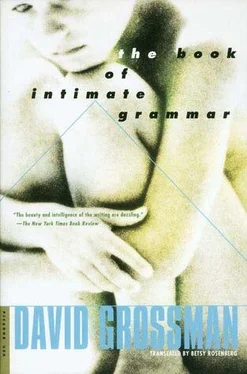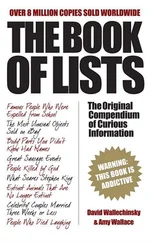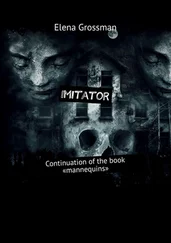David Grossman - The Book of Intimate Grammar
Здесь есть возможность читать онлайн «David Grossman - The Book of Intimate Grammar» весь текст электронной книги совершенно бесплатно (целиком полную версию без сокращений). В некоторых случаях можно слушать аудио, скачать через торрент в формате fb2 и присутствует краткое содержание. Год выпуска: 2002, ISBN: 2002, Издательство: Picador, Жанр: Современная проза, на английском языке. Описание произведения, (предисловие) а так же отзывы посетителей доступны на портале библиотеки ЛибКат.
- Название:The Book of Intimate Grammar
- Автор:
- Издательство:Picador
- Жанр:
- Год:2002
- ISBN:9781466803749
- Рейтинг книги:3 / 5. Голосов: 1
-
Избранное:Добавить в избранное
- Отзывы:
-
Ваша оценка:
- 60
- 1
- 2
- 3
- 4
- 5
The Book of Intimate Grammar: краткое содержание, описание и аннотация
Предлагаем к чтению аннотацию, описание, краткое содержание или предисловие (зависит от того, что написал сам автор книги «The Book of Intimate Grammar»). Если вы не нашли необходимую информацию о книге — напишите в комментариях, мы постараемся отыскать её.
The Book of Intimate Grammar — читать онлайн бесплатно полную книгу (весь текст) целиком
Ниже представлен текст книги, разбитый по страницам. Система сохранения места последней прочитанной страницы, позволяет с удобством читать онлайн бесплатно книгу «The Book of Intimate Grammar», без необходимости каждый раз заново искать на чём Вы остановились. Поставьте закладку, и сможете в любой момент перейти на страницу, на которой закончили чтение.
Интервал:
Закладка:
And very slowly — he was familiar with this process, the heart contracts before the mind catches on — the answer came to him that maybe there’s something in the brain like, say, a soccer center, which was closing up on him for some reason, and he checked himself again, with tremulous composure, noting that there did seem to be some deterioration in the brain center for triangle kicks, and he conducted several more experiments, double-passing with the Atiases’ and Kaminers’ gas canisters, only to discover that he was off in his estimate of the bounce, and he was astonished that in the midst of a war his brain should find time to harass him with something so trivial, and he headed for the stairs, concealing his temporary weakness from the fans.
He sat down, calmed himself. Pounded his kneecap nervously. A lubberly piece of flesh. Come on, get up, play another game, a corrective one, but he didn’t have the strength for it. I’m on the bench, second string. It’s five-thirty already. Where are they — by now they’ve finished working in the fields and croplands, or in the barns and silos, with the plowing and the gathering, the mowing and the grape picking. He never could remember which came when. And they’d all go in to shower together, Aron among them; he would approach the leader and gravely show him the sore on his foot which prevented him from getting his body wet for the duration of work camp, either in the public shower or the swimming pool or water tower. But there were other ways; for instance, he could say he was allergic to the chlorine, it made him break out in ghastly hives, or he could fracture his arm again, like he did last summer in defiance of the trip to Tel Aviv, yes, there goes Aron, strolling through the kibbutz, his arm in a sling, a mere broken arm couldn’t keep him from going out with the rest of the class, colorful doodles and scribbles cover the plaster, just like last time he broke his arm, a chart for crossing out the days till the cast comes off, words of encouragement and the barely legible autographs of friends on the curve,it isn’t easy to write left-handed on your right arm; and after the shower we go in to eat, you should see how they feed us here, not like at home, here nobody coddles you, unpeeled cucumbers with all the vitamins and the natural taste of earth left in, and at midnight we steal chickens out of the coop, or catch a fat pigeon and wring its neck, ping its peck, ding its deck, with a single twist they wring it, they’re capable of that, you know, already they’re capable of it, they aren’t tortured as he is by dreams of a moth implanted in a sticky web, its antennae twitching accusingly; he slapped his knee, hop to, poor flesh — like if you shine a light in your eye, the pupil contracts in seconds, that’s a reflex too, that too is something Aron can perpetrate against his body; “pupil,” now there’s a word for you, Gideon’s father has a flashlight he uses for his coin collection; he groped in his back pocket, the coin was still there, he’d had it for almost two years now, couldn’t get rid of it, and his knee jerked up and down, what will happen when they come back from work camp and notice his latest chendelach, making his knee jerk over and over. And now they’re probably in the dining hall, it’s self-service, there’s a basin on the table for leftovers, and a groundskeeper and a dairyman, and boots and mustaches, and the children’s home, and they smoke in the shadows so the leader won’t see, and at night they have fun painting each other, but only after the campfire, or after skinny-dipping in the pool, don’t skip that in your thoughts.
He ran. Ran across the Wizo Nursery School, up Halutz Street and Bialik Street, all the way to the tree-lined house where she lived, and into the yard where the laundry hung, cool sheets that draped around his face, caressing his cheeks as he slashed his way by them, and they let him pass, led him gently from one to the next, as though helping him out of there. It’s no use, child, go home now, there isn’t anyone here for you. Breathless and exhausted he swept through, emerging at last with a frightened backward glance at the armada of sheets billowing in the wind. He pressed his burning face against Yaeli’s window, peeked through the blinds at her little room. It was dark. No Yaeli in there. But even with his eyes closed he knew this room. There was the bed and there was the bureau and there was the closet and there was her desk. And there was the shelf with her doll collection from when she was a little girl. He smiled. And up there, the cardboard box where she kept her collection of fluffy bits of yarn; Aron himself had supplied her with threads from every sweater he had, the orange one with the stars,the brown checkered one, the abadayat sweater from his bar mitzvah; Mama noticed, when she changed the mothballs, that the sweaters were a fraction of a centimeter out of place, and she waylaid him and caught him in the act, she would skin him alive if she ever found him pulling threads out again, she used the same wool over, year after year, was she a Rothschild, no, she was a balebusteh who could knit the old into new, but he risked his life to pull out more threads for Yaeli, even from the green one, his newest, with the big white triangles; he plucked it out and gave it to Yaeli, to hide in her treasury of fluff, like a woolly nest with carousel colors; and in his mind’s eye he saw her messy desk, with the ink spot the shape of an apple, and the clipping from Maariv Magazine for Youth which she’d tacked up over it: Love is calling. The flame of love is calling to you. You must love the trembling lips that say it: Love. You must notice little things, a smile that plays upon tender lips. A dreamy gaze. A teardrop hiding a mute and bitter pain. He read through the slats in the blinds, with mouth a-tremble: You must desire to tread this earth in search of its profoundest secrets, the riddles of the night. You must gaze into a young girl’s eyes, ready to feel the warmth of love, though it burns you till you cry out in pain. True love is single-hearted, a great, strong surging of the blood. Tears wrung out of sacred sentiments … He was worried about this last bit of youthful eloquence by our correspondent in Ashkelon, Ziona Kapach, hanging there before his innocent Yaeli’s eyes; what if she wasn’t ready for such a burning love yet, and was tempted by the pretty words into trying something cheap and phony, love isn’t a game, you know, it’s a matter of life and death, you can save a life with love, and maybe Yaeli’s feelings were lighter than his, a little shallower, maybe she wasn’t committed the way he was; oh, if only he could learn from her the wisdom of that lightness of feeling. As he backed away from the window, something touched his head and frightened him: the laundry again. Sleeves and hems hung limply now. The sheets were like empty sails. He walked through with his eyes closed, lost among them, how did Ziona Kapach from Ashkelon learn to speak so true. He wound a shirtsleeve around his hand, a towel, a pillowslip, meandering through this grove of ghosts, drawing profound secrets and tears and sacred sentiments after him, words to be purified inside before he said them aloud, lightheartedly; and he tasted the name of the stranger from Ashkelon, Ziona Kapach. Who was she? Not one of ours, judging by her surname, and he secretly fleshed herout in a shack full of barefoot children wading in the mud and a drunken father, and in the corner of the shack, by the light of a kerosene lamp, sits a slender girl with a serious, delicate face and glasses, writing the profoundest secrets of her heart, and suddenly her father comes up and starts beating her and yelling, Get out of here and earn some money, and her mother laments that Ziona doesn’t know how to cook and sew, she has two left hands, who would ever marry her, a blot on the family, and Ziona looks up, entreating, despairing: from whence will her help come, is there anyone in the whole world who can understand her in her loneliness? If only he had the nerve to send her a letter. She would understand him. He could tell her everything, simply, without digressions. And she would read his letter by the light of the kerosene lamp, transported to him out of her life. She would have stayed. Yes. She would never have left him like that. He was frightened. Because of the betrayal. Again he whispered, Yaeli, till he felt the ember spreading circles of warmth inside him. He reached out. He ran his hand over the clothesline with his eyes shut. He grabbed something. He stuck it in his pocket. Ran away. Ran for his life. At the corner of the boulevard he stopped. He ducked into the bushes, took it out of his pocket: her sock. The green-and-red stocking. He sniffed it: the good smell of laundry soap. He inhaled deeply. Good. Good. Everything was good. Then he wrapped the sock around his fist and was amazed: was her heart so small, then? How could such a heart contain the heart of one who tried to win it? Run, get help, go to Mt. Tabor and rescue Yaeli in a daring night raid. But already he knew that he was too weak, he wasn’t what he used to be, so what was he, so who was he, who was the real twin and who was the one who had slyly taken over, because sometimes while he was pissing he would cover his face with a towel and listen to it streaming out with a different sound, a deeper sound, as though it were someone else’s; what did it mean, who was pissing out of him? He stuck the sock in his pocket and began running helter-skelter, awash with sweat, seeking refuge in the crowded shopping center, pretending to be calm, like a normal boy. But they noticed him right away. He was the only child there. He and the barber’s son Binyumin, who leaned against the door of the barbershop and watched him with interest. And Aron hurried by. As if he had somewhere to go. Straighten up so they won’t think you’re a hunchback too on top of everything. Surely Binyumin would hit him now. Now that he was a head taller than Aronhe would get revenge for the beating he’d taken from him way back when. But Binyumin wasn’t thinking about hitting him. He merely watched him and hinted with his eyes: Over there, over there. Where? There. But there’s nothing there. Except Morduch, the blind man. Sitting, moving around. And Aron turned away with his head held high. Mosco the iceman’s cart horse swerved around and looked into his eyes. Aron tried to fight it, to control himself, but his fingers dug deeper and deeper into his pocket, touching the rotten onion strips: on Moshav Aderet a two-headed calf was born, read the horse through the onion strips, and bared its teeth in wild laughter. Aron recoiled and walked blindly by. Someone turned on the loudspeaker in the square, whistles and squeaks filled the air. A song started and suddenly stopped. Remember our names forever. Preparations for Memorial Day. And there was Morduch again. In the exact same place. Muttering over his rusty tin can. The can of Richard Levy corned beef they always took on the yearly school trip. But why was he here looking at Morduch again, wasn’t he going in a different direction? And he quickly strode ahead wearing a troubled expression, following two big guys who were juniors in high school, and one of them who looked like Mickey Zik, Anat Fish’s boyfriend, said in a loud voice: “So anyway, when the other animals saw it was no go they decided to send the rabbit in to show the lion how you do it.” And Aron froze. It was crowded. He took a few more steps.
Читать дальшеИнтервал:
Закладка:
Похожие книги на «The Book of Intimate Grammar»
Представляем Вашему вниманию похожие книги на «The Book of Intimate Grammar» списком для выбора. Мы отобрали схожую по названию и смыслу литературу в надежде предоставить читателям больше вариантов отыскать новые, интересные, ещё непрочитанные произведения.
Обсуждение, отзывы о книге «The Book of Intimate Grammar» и просто собственные мнения читателей. Оставьте ваши комментарии, напишите, что Вы думаете о произведении, его смысле или главных героях. Укажите что конкретно понравилось, а что нет, и почему Вы так считаете.












